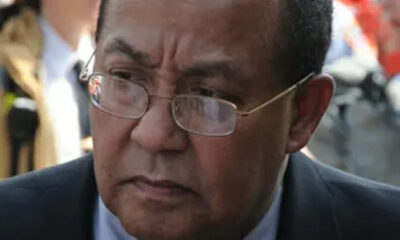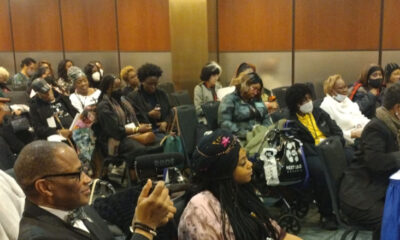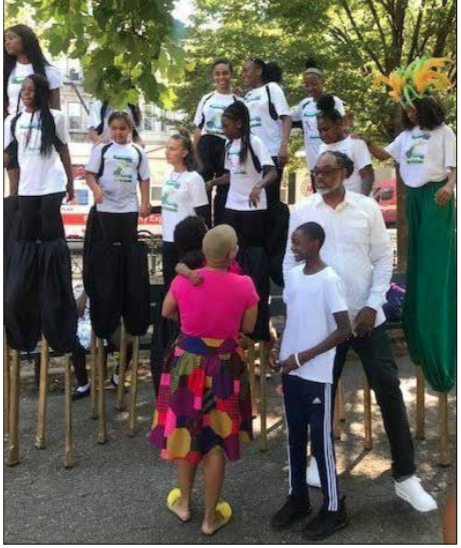featured
A Chairman’s Uplifting Homegoing

Riverside Church filled for services of Percy Ellis Sutton.
It was standing room only in the uppermost region of the Riverside Church for the homegoing service of Percy Ellis Sutton. Giving the Personal Tribute, Reverend Jesse Jackson said, “The tallest tree in our forest has fallen,” calling Sutton an authentic Renaissance Man. He spoke of how “The Chairman” had stood with Malcolm X, Martin Luther King, Jr., Nelson Mandela. “He left more than he found.”
In a statement videotaped earlier at the church, Governor Paterson said that more than a media mogul and entrepreneur, that Percy was a leader, teacher, mentor and friend. Sutton was steadfast and disciplined and “He was the first person to advise me about my vision, the first person to suggest I run for office,” and he “gave correction in such a way that you’d think it was a compliment.” (This was later amended by Inez Dickens, who assured everyone that Sutton could also correct you in a way such that you knew you were corrected.) Paterson made the case that without the life of Percy Sutton, he would not be governor now.
Mayor Michael Bloomberg said that Sutton’s “greatest accomplishment was his own life. He took his destiny in his own hands.” Listing Sutton’s accomplishments, Bloomberg said he made Black radio a fixture in New York, saved the Apollo Theater, Charles Rangel became a congressman, David Dinkins became mayor and Paterson became Governor. The mayor announced that the cluster of schools on Edgecombe Avenue in Harlem will be named the Percy Ellis Sutton Educational Complex. “He made a difference,” concluded the mayor.
U.S. Attorney General Eric Holder said that, “The opportunities my generation have been given are possible because of the work” of Sutton’s generation and acknowledged that he stands on Sutton’s “still-broad shoulders.”
An interview of Sutton was shown and he recounted that he “could not get a Black professional to come to a meeting” with Malcolm X. He said that he had to learn that he “could not go frontally” when confronted with obstacles, but “had to go in from the sides.”
Congressman Charles Rangel apologized to the family, saying of his mentor and friend, “We treated Percy like we owned him. I called him like I was calling home.” He recounted how special it was to Mr. Sutton when someone came up to him on the street and said, “God bless you Percy Sutton.” “And this is what Percy was all about.”
The congressman challenged the assembled saying as long as someone is without, then it is the obligation of those who knew Percy to offer help. He also gave them hope saying “there is a little bit of Percy in each of us,” and that as he leaves to meet with the president, there will be that little bit of Percy coming to Washington with him.
Melba Moore sang “Amazing Grace” and Stevie Wonder said he was “Happy for the family that you had such a king in your life,” and then sang an amazing “I’ll be Loving You Always.”
In the Family Remembrances, nephew Charles Andrews said he spoke with Leatrice, Mr. Sutton’s wife of sixty-six years, she was angry saying, “He left me.” He assured Leatrice that “You are his window. Through your eyes he sees, through your heart he loves.” He said that when he had recently seen his uncle, Sutton had told him to tell Leatrice, “Smile, and remember when.”
Granddaughter Keisha Sutton-James said her grandfather was larger than life. “He was my hero. By example, he taught me how to love.” She added later, “When I would walk into the room, he’d give me a standing ovation. How important was that to this little Black girl?”
Daughter Cheryl spoke of the tradition of Sutton making soup after Thanksgiving. “People may forget what you say, and forget what you do, but they never forget how you made them feel.”
Malcolm X’s daughter Atallah Shabazz said, “How blessed we are that Percy touched our lives.” She spoke of how when others kept away from Malcolm and the family, “Percy chose to stand nearby.”
“I could not be what I am today without Mr. Sutton. I will be an example of your majesty by any means necessary.”
Walter Edwards remembered, “A man for all seasons who looked past what a man was and could see what he could be.” Percy was Black and Proud before James Brown said it and understood the responsibility of a proud man.
Clarence Jones gave a moving remembrance of Sutton calling Jones’ hospital and guaranteeing payment of an expensive medical procedure. “Good-by my audaciously proud brother.”
Roscoe C. Brown, Jr. said he knew Sutton since their days together as Tuskeegee Airmen attached to the 332nd Fighter Group. Sutton was the intelligence officer and Brown said his flourishes in reporting the missions for citations “made heroes out of us.”
Mayor David Dinkins had to stop and compose himself several times as he spoke of “We three, who were once the ‘Gang of Four’,” referring to Basil Paterson, Percy Sutton, Charles Rangel and himself. He was one of the most dedicated, dynamic and determined individuals to be met, said Dinkins. He also mentioned that one of the most important elements of Sutton’s walk from his home was someone coming up to him and saying, “God bless you Percy Sutton.” He was our inspiration and our guiding force. “Then we were four, now we are three.”
Dinkins said to remember that “Apples did not fall from the tree, they were shaken by our ancestors. Had there been not Chairman Sutton, there would have been no Mayor Dinkins.”
Basil Paterson knew Percy as a friend and a Renaissance man. He rebuilt 125th Street. He was fiercely loyal and always there for the underdog.
Reverend Al Sharpton gave the Eulogy and spoke of Sutton, who even as a multi-millionaire, laid down in front of One Police Plaza for Amadu Diallo, “AWest African boy he never knew.”
“Percy knew he was a giant but too many around him had grasshopper complexes. Percy invested in a community that didn’t even believe in itself.”
“He did not let America change him, he changed America.” “A hundred years from now they will celebrate Percy Sutton, a man who dreamed dreams and made them come true. He made little people feel important. He made us feel important.”
Sharpton ended with a story of how Mr. Sutton had come to his support at a critical time, and had held up a picture of the reverend and said “I am Al Sharpton.” Speaking of how the Chairman’s spirit will live on, Sharpton held up a picture of Mr. Sutton, saying, “I am Percy Sutton.”
David Mark Greaves







